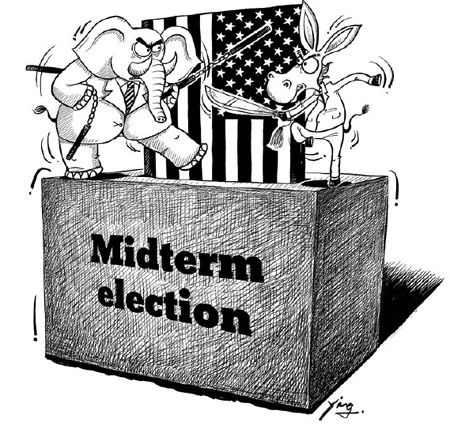View
Ties face US midterm poll test
By Li Qingsi (China Daily)
Updated: 2010-11-02 07:57
 |
Large Medium Small |

The United States midterm election will be held on Tuesday, Nov 2, which traditionally is a test of the incumbent government's performance in its first two years in office. This time, the ruling Democratic Party may lose control of one or both houses of Congress (House of Representatives and Senate), because its political achievements are far from impressive.
The existing situation in the US does not augur well for the Democrats, who "suffered from an inherent misfortune", because they assumed power from the Republicans during the global financial crisis. Though the Barack Obama administration has employed all its skill to overcome the crisis - by trying to increase employment and boost consumption (it even printed several hundred billion dollars of banknotes) - it has not succeeded. Perhaps the reason is that the US' economic problems have accumulated over the years and cannot be solved overnight.
It seems that Obama, who won the presidential election by opposing the Iraq War, vowing to bring about change and listen to ordinary Americans' voices, has failed to make good on his promises.
The Democrats blame former US president George W. Bush's policy on the Iraq War for the mess. But the Democrats did not reduce the Iraq War funds even after getting control of both houses of Congress. Irresponsible expenditure, astronomical salaries of some Wall Street CEOs and the high unemployment rate have forced millions of people to lose their retirement benefits as well as their hope. They have undermined Obama's contribution to promote healthcare reform, too.
The rising influence of the Tea Party movement, which emerged through a series of spontaneously coordinated protests, reflects the right turn the US is taking. Americans, in general, think the state is walking on the wrong track and hence they have lost trust in the government.
Thus, Nov 2 is not likely to be a good day for the Democrats. According to a poll conducted by realclearpolitics.com and the opinion of almost all analysts, the Republicans are likely to win the majority of seats in the House of Representatives. At present, they are ensured of 214 seats, while the Democrats hold only 179. And the fight for the rest of the 42 seats, 40 of which are now held by the Democrats, is hot.
The Republicans are likely to get 20-30 seats of the 40 to be contested, taking their lead to 55-65 seats. In the Senate, the two parties are contending for eight seats, three of which may be go to the Democrats, resulting in an equally matched house.
But predicting the midterm election result is risky. Angry Americans want to punish those who formulated the national policies, but they also understand that any other administration would have performed as badly. Of course, the policy of the current government cannot produce immediate results and the Democrats know who is responsible for the problems. The problems have worsened because of past policies of conscienceless politicians and the rich, especially some Wall Street elites.
As an American netizen has said, the enemies of American voters are the elites who ignore the people and care only about money (this is a universal truth).
From the perspective of foreign policy, the impact of the midterm election will not be felt immediately. Certainly, a "divided government" with Republicans-led Congress and Democrats-dominated White House will complicate the foreign policy formulation process, though the cost finally will be shifted to others, with China bearing the brunt as experience shows.
In the campaign for the presidential election that Obama won, the China factor was not used as strongly as it was in the past. Therefore, it should not make much sense to play up the "China factor" in the midterm election.
But given the close trade relations China has with the US and Washington's claim that an undervalued yuan is the cause of most of the US' economic woes including its huge trade deficit, American politicians were not expected to let go of the chance to use China to garner votes. For example, Democrat Senator Charles Schumer and his Republican counterpart Lindsey Graham won US nationals' praise by highlighting the yuan issue. This shows Congress members, regardless of their party affiliations, can join hands to win an election.
It is not certain what course China-US relations will take after the midterm election. China and the US disagree over many issues. The Obama administration has attached importance to the common interests of the two countries right from the day he assumed office (its position changed later). Though a number of US Congress members acknowledge the importance of common interests, not everyone thinks on the same lines. Given their different political beliefs, their views toward China are different.
Nancy Pelosi, an idealist, adopted a different attitude toward China after she was appointed speaker of the US House of Representatives. And though she may take overall responsibility for the Democrats' diplomacy and not make any irrational decisions, the opposition Republicans may "care nothing about" diplomacy.
Practice shows a "divided government" makes the US policy-making process toward China more complex. For instance, Ileana Ros-Lehtinen, Republican representative from Florida and the ranking member in the House Foreign Affairs Committee, differs with Obama's policy toward China.
It can be foreseen that if the Republicans are in charge of the Senate or the House of Representatives, they can bargain harder with the Obama administration on its policy toward China.
The author is a professor at the School of International Studies, Renmin University of China.